Related Research Articles
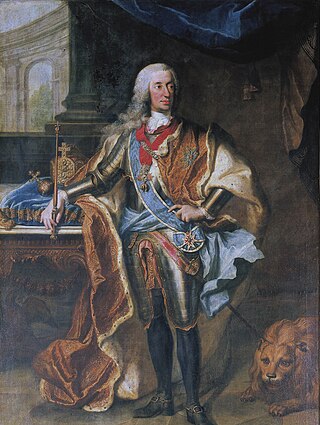
Charles VII was Prince-Elector of Bavaria from 26 February 1726 and Holy Roman Emperor from 24 January 1742 to his death. He was also King of Bohemia from 1741 to 1743. Charles was a member of the House of Wittelsbach, and his reign as Holy Roman emperor thus marked the end of three centuries of uninterrupted Habsburg imperial rule, although he was related to the Habsburgs by both blood and marriage.
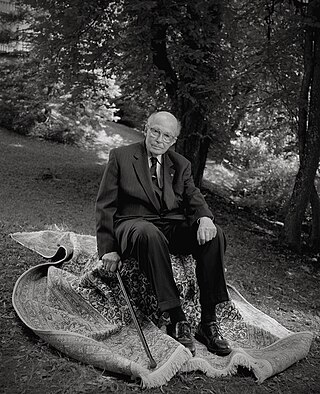
Otto von Habsburg was the last crown prince of Austria-Hungary from 1916 until the dissolution of the empire in November 1918. In 1922, he became the pretender to the former thrones, head of the House of Habsburg-Lorraine, and sovereign of the Order of the Golden Fleece, upon the death of his father. He resigned as Sovereign of the Golden Fleece in 2000 and as head of the Imperial House in 2007.

Charles I was Emperor of Austria, King of Hungary and King of Croatia, King of Bohemia, and the last of the monarchs belonging to the House of Habsburg-Lorraine to rule over Austria-Hungary. The son of Archduke Otto of Austria and Princess Maria Josepha of Saxony, Charles became heir presumptive of Emperor Franz Joseph when his uncle Archduke Franz Ferdinand of Austria was assassinated in 1914. In 1911, he married Princess Zita of Bourbon-Parma. He is venerated in the Catholic Church, was beatified by Pope John Paul II on 3 October 2004, and is known to the Catholic Church as Blessed Karl of Austria.
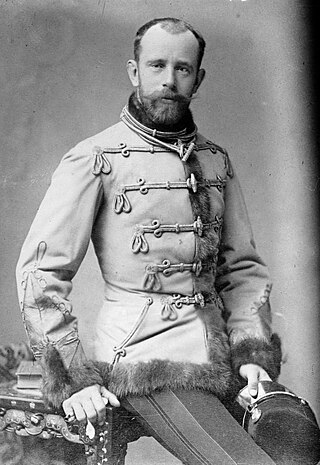
Rudolf, Crown Prince of Austria was the only son and third child of Emperor Franz Joseph I of Austria and Duchess Elisabeth of Bavaria (Sisi). He was heir apparent to the imperial throne of the Austro-Hungarian Empire from birth. In 1889, he died in a suicide pact with his mistress Baroness Mary Vetsera at the Mayerling hunting lodge. The ensuing scandal made international headlines.

Kurt Alois Josef Johann von Schuschnigg was an Austrian politician who was the Chancellor of the Federal State of Austria from the 1934 assassination of his predecessor Engelbert Dollfuss until the 1938 Anschluss with Nazi Germany. Although Schuschnigg considered Austria a "German state" and Austrians to be Germans, he was strongly opposed to Adolf Hitler's goal to absorb Austria into the Third Reich and wished for it to remain independent.

Bianca Maria Sforza was Queen of Germany and Empress of the Holy Roman Empire as the third spouse of Maximilian I. She was the eldest legitimate daughter of Duke Galeazzo Maria Sforza of Milan by his second wife, Bona of Savoy.

The Austrian nobility is a status group that was officially abolished in 1919 after the fall of Austria-Hungary. Austria's system of nobility was very similar to that of Germany, as both countries were previously part of the Holy Roman Empire (962–1806).

Johanna Bertha Julie Jenny Edle von Westphalen was a German theatre critic and political activist. She married the philosopher and political economist Karl Marx in 1843.

Gerhard Bronner was an Austrian composer, writer, musician and a cabaret artist, known for his contribution to Austrian culture in the post-World War II period.

Julius Hans Weigel was an Austrian Jewish writer and a theater critic. He lived in Vienna, except during the period between 1938 and 1945, when he lived in exile in Switzerland. He was a lifetime companion of the Austrian actress Elfriede Ott.
Erich Feigl was an Austrian documentary film producer and author. He produced almost 60 documentaries, mostly for the Austrian ORF but some for BR (Bavarian), ZDF (German) and TRT in co-production. He authored books about the Habsburgs, whose restoration he supported, and the historical fact of the Armenian genocide, which he denied until his death.
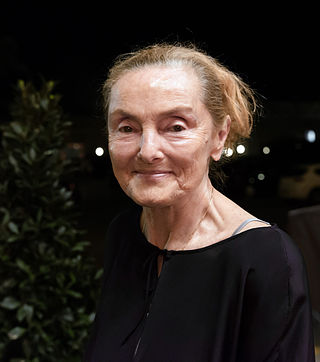
Erni Mangold is an Austrian actress and stage director. Since 1948, she had appeared in more than 75 films and TV productions.

Archduke Hubert Salvator of Austria, Prince of Tuscany was a member of the Tuscan line of the House of Habsburg and Archduke of Austria, Prince of Tuscany by birth.
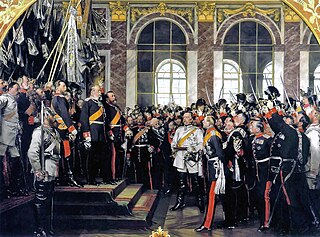
The proclamation of the German Empire, also known as the Deutsche Reichsgründung, took place in January 1871 after the joint victory of the German states in the Franco-Prussian War. As a result of the November Treaties of 1870, the southern German states of Baden, Hesse-Darmstadt, with their territories south of the Main line, Württemberg and Bavaria, joined the Prussian-dominated "North German Confederation" on 1 January 1871. On the same day, the new Constitution of the German Confederation came into force, thereby significantly extending the federal German lands to the newly created German Empire. The Day of the founding of the German Empire, January 18, became a day of celebration, marking when the Prussian King William I was proclaimed German Emperor at the Palace of Versailles, outside Paris, France.
Renate Holm was a German-Austrian film actress and operatic soprano. She worked as a dentists' assistant and took private singing lessons, resulting in performances in musical films and schlager. She made her debut at the Vienna Volksoper in 1957, and moved on to the Vienna State Opera where she worked for decades. She appeared internationally and made many recordings, especially for the WDR in a series of operettas with conductor Franz Marszalek. She later worked as a voice teacher, juror at competitions, and festival manager. Her memoir was published in 2017.
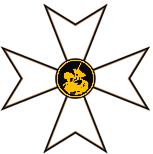
The Order of St. George – a European Order of the House of Habsburg-Lorraine, or simply Order of Saint George, is a dynastic order of chivalry and thus a house order of the House of Habsburg-Lorraine, the former Imperial and Royal House of the Holy Roman Empire, the Habsburg monarchy, the Empire of Austria, the Austro-Hungarian Monarchy, the Kingdom of Hungary, the Crown lands of Bohemia and Kingdom of Croatia-Slavonia and further nations.

Werner Schneyder was an Austrian kabarett performer, journalist, writer, actor, stage director, television presenter and sports reporter. He performed political kabarett with Dieter Hildebrandt from 1974 to 1982, with an extra program presented in Leipzig, then in the GDR, in 1985. He moderated das aktuelle sportstudio on ZDF from 1975, and a series about boxing for RTL from 1992 to 1999. He described himself as a Universaldilettant.
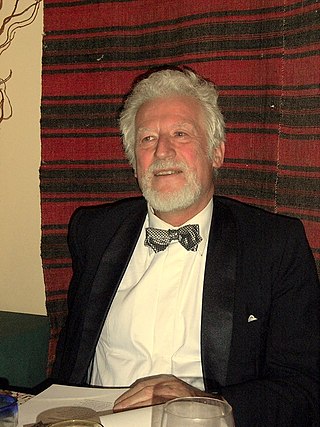
Helmut Birkhan is an Austrian philologist who is Professor Emeritus of Old High German Language and Literature and the former Managing Director of the Institute for Germanic Studies at the University of Vienna.

Maximilian I was Holy Roman Emperor from 1508 until his death.

Monika Czernin is an Austrian writer, screenwriter, actress and film director.
References
- ↑ Haris Huremagić. "The absence of war is far from being peace" (PDF). historycampus.org. Retrieved 21 April 2023.
- ↑ "Europeanideas.eu".